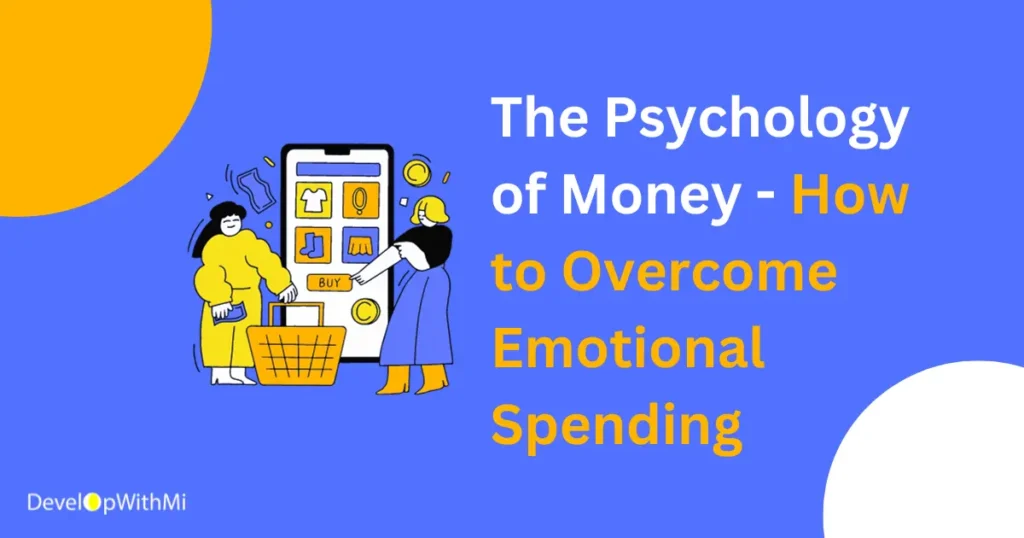Money plays a significant role in our lives, affecting our choices, lifestyle, and overall well-being. However, our relationship with money is often intertwined with our emotions, leading to impulsive and sometimes detrimental spending habits. In this blog, we will delve into the psychology of money and explore how to overcome emotional spending habits.
Understanding Emotional Spending
What is the psychology of emotional spending?
The psychology of emotional spending revolves around the notion that our emotions heavily influence our financial decisions. Whether it’s stress, sadness, boredom, or even happiness, our emotional state can trigger impulsive buying behavior. Advertisements, social influence, and societal pressures also play a significant role in driving emotional spending.
How do emotions affect spending habits?
Our emotions can impact our spending habits in various ways. When experiencing certain emotions, such as stress or sadness, we may seek instant gratification through impulsive purchases. The desire for a temporary mood boost or emotional comfort often leads to overspending. Understanding these psychological mechanisms can help us make conscious choices about our financial well-being.
Overcoming Emotional Spending Habits
How do I stop emotionally spending money?
To stop emotionally spending money, consider implementing the following strategies:
- Recognize emotional triggers: Be aware of the emotions that tend to lead to impulsive buying. By identifying these triggers, you can develop a proactive mindset towards managing your spending behavior.
- Practice mindfulness: Before making any purchasing decisions, take a moment to evaluate your emotional state. Mindfulness allows you to pause and assess whether the urge to spend is driven by genuine need or a temporary emotion.
- Create a budget and financial goals: Setting a budget and defining clear financial goals helps establish priorities. By focusing on long-term financial well-being, you can resist the allure of immediate emotional gratification.
- Delay gratification: Implement a waiting period before making non-essential purchases. By giving yourself time to reflect, you can reduce impulsive behavior and make more rational decisions.
- Find healthy alternatives: Seek healthier ways to cope with emotions. Engage in activities such as exercise, hobbies, or spending quality time with loved ones, which provide genuine fulfillment without the financial burden.
How do I stop overspending psychology?
Overcoming the psychology of overspending requires understanding the underlying psychological factors involved. Consider the following steps:
- Fear of missing out (FOMO): Acknowledge the urge to keep up with trends and peer influence. Focus on what truly matters to you and align your spending with your personal values rather than external pressures.
- Retail therapy: Recognize the temporary satisfaction gained from buying and the long-term consequences it may have on your financial well-being. Explore alternative ways to find comfort and address underlying emotions without relying on material possessions.
- Instant gratification: Emphasize the benefits of delayed gratification. Remind yourself of the satisfaction that comes from saving for meaningful purchases rather than succumbing to impulsive buying for immediate but short-lived happiness.
What is an example of emotional spending?
Let’s consider an example to illustrate emotional spending. Jane, a young professional, often feels stressed at work. To cope with her stress, she frequently indulges in online shopping, purchasing items she doesn’t need. The act of buying provides her with a temporary sense of relief and excitement. However, over time, Jane realizes that her impulsive spending has led to financial strain, exacerbating her stress levels. This example demonstrates the connection between emotions, impulsive buying, and their impact on one’s financial well-being
Understanding and Managing Emotions
How do I stop buying things to feel better?
To break the cycle of buying things to feel better, consider adopting healthier alternatives:
- Seek emotional support: Reach out to friends, family, or professionals during difficult times. Talking about your emotions and seeking support can provide comfort and help you navigate through challenging situations without resorting to retail therapy.
- Practice self-care: Engage in activities that promote self-care and well-being. Take time for relaxation, pursue hobbies, practice mindfulness or meditation, and prioritize self-care practices that nourish your mind, body, and soul.
- Keep a journal: Writing down your emotions and thoughts can help you gain clarity and identify patterns. By journaling, you can explore alternative ways to address your emotions and find solace without relying on material possessions.
Why do I want to spend money when I’m sad?
The desire to spend money when feeling sad is rooted in several factors:
- Emotional escape: Spending money provides a temporary distraction from negative emotions. It can offer a brief respite from sadness by redirecting attention and providing a sense of excitement or novelty.
- Retail therapy: The act of buying something new can create a momentary boost in mood. This phenomenon, known as retail therapy, stems from the belief that material possessions will improve one’s well-being and alleviate sadness
- Unconscious associations: Personal experiences and conditioning can create unconscious associations between spending money and happiness. If you’ve had instances where buying something lifted your spirits, your brain may have formed an automatic connection between spending and emotional relief.
Understanding the psychology of money and emotional spending habits is essential for maintaining healthy financial well-being. By recognizing the influence of emotions on spending behavior, we can take steps to overcome emotional spending habits. By practicing mindfulness, setting financial goals, and finding healthier alternatives, we can break free from impulsive buying and cultivate a healthier relationship with money. Remember, true fulfillment and happiness come from within, not from material possessions. By prioritizing emotional well-being and making conscious choices, we can achieve long-term financial stability and lead a more fulfilling life.




